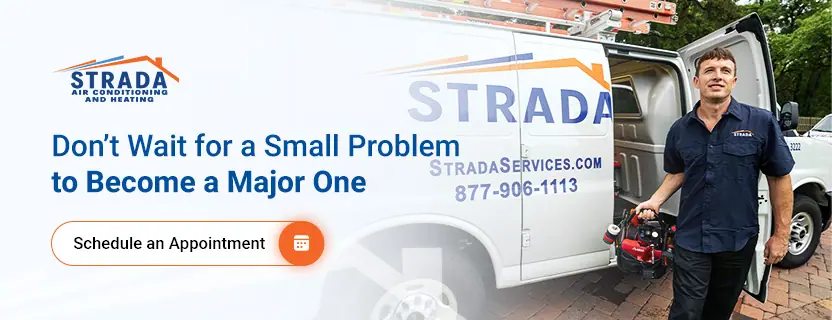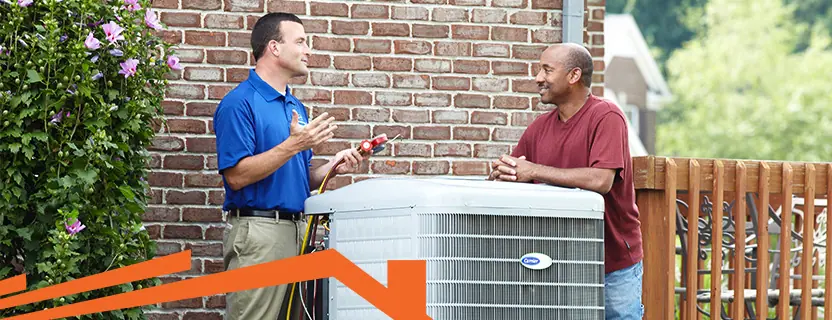
When your air conditioner (AC) unit starts acting up, such as making unusual noises or refusing to turn on, it’s natural to wonder if you can fix it yourself. After all, you can find countless DIY videos online promising easy solutions. But when it comes to your home’s cooling system, the line between a simple tuneup and a risky repair isn’t always clear.
If you live in Florida or the South, where your AC runs nearly year-round, that line becomes even more critical. Some maintenance tasks are perfectly safe for homeowners to tackle. Others can quickly spiral into costly or even dangerous territory without professional training and tools.
This guide breaks down what you can safely handle on your own, when to call in an expert and what’s really at stake when weighing DIY vs. professional AC repair. Let’s help you make the smartest and safest decision for your home.
Before calling a technician, there are a few easy maintenance tasks you can do to keep your system in good shape. These small actions can improve efficiency, prevent breakdowns and save you money in the long run. Think of them as regular AC upkeep.
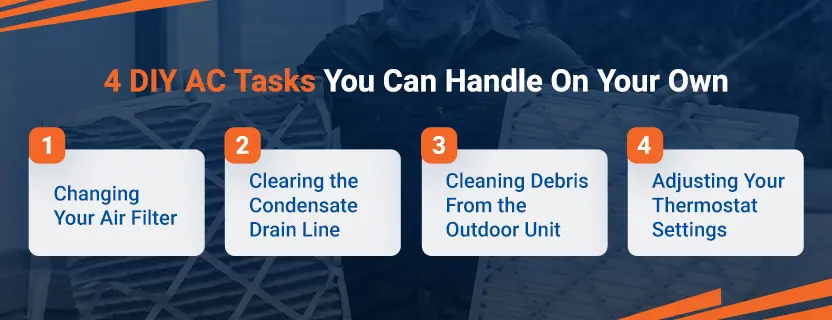
A dirty air filter is one of the most common causes of poor AC performance. When the filter clogs with dust, pet hair and debris, it restricts airflow. That means your system must work harder to push air through, increasing energy use and strain on key components.
How often should you really be changing your air filter? For southern homeowners, air filters typically need to be changed every 60 days if you have an average family home. Sometimes you’ll have to change the filters even sooner, like every 30 days, if you have pets or allergies. To do it, follow these steps:
According to the U.S. Department of Energy, replacing a dirty filter can lower your air conditioner’s energy consumption by 5-15%. High humidity and year-round use mean your air conditioning filters collect debris faster than in cooler climates.
Your AC cools the air, and it removes moisture. That moisture collects in a drain pan and flows out through a condensate line, typically a small PVC pipe leading outside.
The South’s humidity, however, creates the perfect environment for algae and sludge buildup inside that line. When it clogs, water backs up into your system, triggering safety shutoffs or causing leaks around your indoor unit.
Use these steps to clean the condensate drain line:
This is a simple, preventive task that can save you from dealing with water damage or a service call later on.
Your outdoor condenser unit needs adequate space to function properly. If it’s surrounded by leaves, grass clippings, or mulch, airflow gets restricted, forcing the system to work harder to expel heat.
To manage surrounding debris, follow these steps:
This simple upkeep keeps your system from overheating and helps it run more efficiently, especially during the South’s long cooling season.
It sounds obvious, but sometimes the issue isn’t your AC, it’s your thermostat. Before assuming the worst, do the following:
Smart thermostats can sometimes reset after a power outage or software update, so verifying your settings can save you the frustration and cost of an unnecessary repair call.
These basic maintenance steps go a long way in keeping your system healthy. But once you start noticing performance issues like leaks, noises or warm air, it’s time to bring in the experts.
While DIY repairs might seem like a cost-effective solution, they can quickly turn into an expensive issue if not handled correctly. AC systems require specialized knowledge and tools, and attempting repairs without the proper expertise can lead to a variety of problems.
Let’s explore the risks of improper DIY repairs, from safety hazards to voiding your warranty and causing further damage to your unit.
Your AC system is not a simple appliance. It involves 240-volt power, high-pressure refrigerant and sensitive electronics. One wrong move could mean an electrical shock, refrigerant exposure, or a system-wide failure. Even with online tutorials, the risk is substantial, especially without proper safety gear and diagnostic tools.
Most modern AC units come with a manufacturer’s warranty that protects key components, but those warranties almost always specify that repairs must be performed by a licensed professional.
Opening the system or attempting your own fix could void this protection, leaving you on the hook for full repair or replacement costs.
Even a small mistake can have big consequences. Overtightening a fitting, misidentifying a part, or using the wrong refrigerant type can turn a minor issue into a multi-thousand-dollar repair — recharging with the wrong refrigerant poses catastrophic event and injury risks. A technician can fix the problem and prevent secondary damage that often follows a poorly executed DIY attempt.
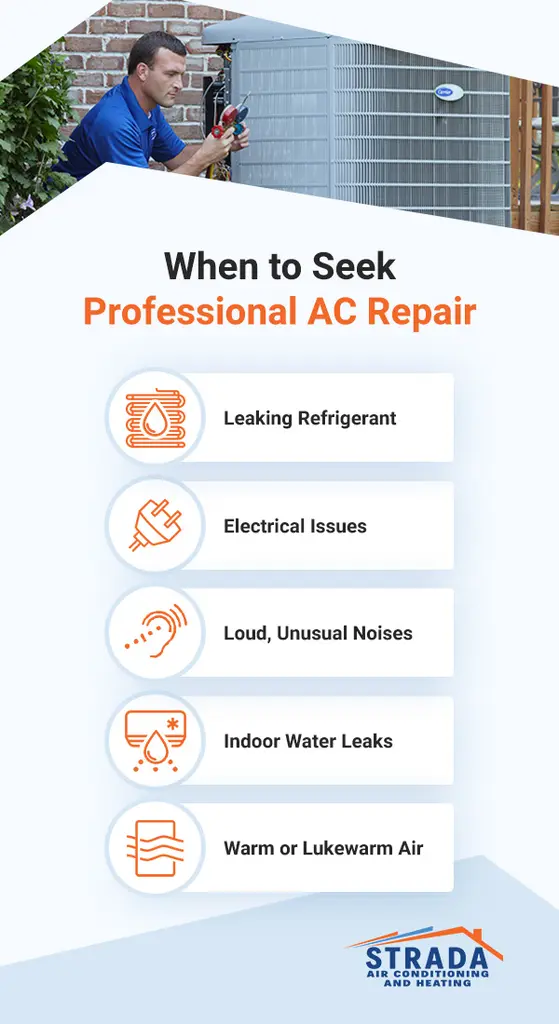
DIY maintenance is great for prevention. But repairs? That’s a whole different story. Air conditioning systems involve high-voltage electricity, pressurized refrigerant and intricate components that require specialized tools and training. A professional can provide both preventive maintenance and repair service. If your system shows any of the following signs, it’s time to call an expert. Attempting to fix these issues yourself can make things worse or make you unsafe.
Refrigerant isn’t just another fluid — it’s a regulated chemical compound critical to your AC’s cooling process. When it leaks, the system loses its ability to absorb heat effectively, leading to longer run times, higher energy bills and poor cooling performance.
Signs of a refrigerant leak include:
Refrigerant handling requires EPA certification and specialized tools to safely recover, measure and recharge the system. Trying to patch or refill refrigerant lines yourself can lead to contamination, damage, or even chemical burns.
If you suspect a leak, shut off the system and schedule a professional repair immediately. Leaking refrigerant affects comfort and can harm the environment.
Anything electrical should be treated with caution. Your air conditioner uses high-voltage power, and improper handling can cause severe injury or damage to the system.
Warning signs of electrical problems include:
These symptoms often point to problems like faulty wiring, capacitor failure, or motor issues — all of which demand professional electrical diagnostics. Attempting a fix without the right training is risky and could void your warranty or homeowners insurance coverage.
A quiet hum is normal. Grinding, screeching, or banging noises are not. Each sound can indicate a specific mechanical problem:
Continuing to run the system with these noises can cause parts to break completely or lead to a compressor burnout, which can be a costly repair. Professionals have the tools to isolate the source of the noise and prevent additional damage.
If you notice puddles around your indoor air handler, don’t ignore them. A clogged condensate line is one possibility, but indoor water leaks can also result from:
Each requires a different repair approach. Professionals can diagnose the true cause and prevent water damage to your walls, ceilings, or floors. Left untreated, even a small leak can lead to mold growth in Florida’s humid environment.
When your AC is running but not cooling, you might first check the thermostat or filter. If both are fine, the issue likely runs deeper. Common causes of warm or lukewarm airflow include:
All of these problems require professional testing and tools. Continuing to run the system can make the damage worse. A trained technician can pinpoint the problem quickly and restore proper cooling before your home becomes too hot.
While DIY solutions might seem appealing, professional AC repair offers significant advantages. From proper diagnostics to lasting solutions and improved safety, here’s why calling in an expert is often the best choice.
AC systems are complex, with multiple components that can produce similar symptoms. A professional technician uses advanced diagnostic tools, such as multimeters, refrigerant gauges and thermal imaging to quickly identify the root cause. This accuracy saves time, money and unnecessary trial and error.
Professional repairs are about getting the system running again and restoring efficiency and reliability. Technicians check for underlying issues, clean vital components and calibrate the system for optimal performance. This level of care can extend the lifespan of your unit and reduce future breakdowns.
The biggest benefit of hiring a professional is confidence. You can trust that your repair was done safely, in compliance with local codes and manufacturer standards. Plus, reputable companies stand behind their work with warranties or service guarantees, providing true peace of mind.
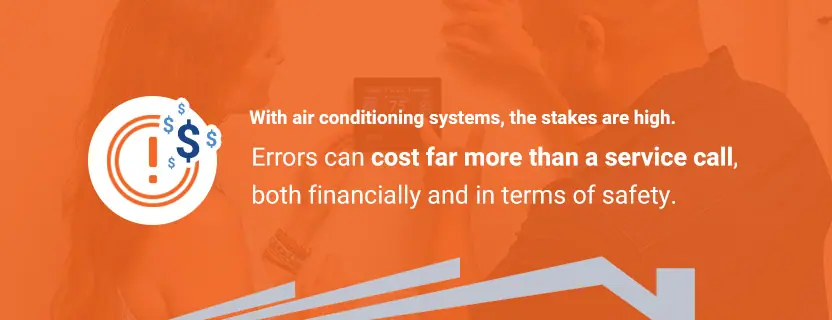
The DIY route can be tempting. It seems faster, cheaper and more empowering. But with air conditioning systems, the stakes are high. Errors can cost far more than a service call, both financially and in terms of safety.
When it comes to DIY vs. professional AC repair, the smartest move is knowing your limits. Handle the simple maintenance tasks confidently, but leave the heavy lifting to the experts. Because summer in the South is hot, your AC is a luxury and a lifeline. And that’s something worth protecting.
At the end of the day, maintaining your AC is like maintaining a car. You can change the oil and check the tires, but when something goes wrong under the hood, you need a certified mechanic. The same logic applies here. Basic cleaning and filter changes are part of responsible homeownership, but actual repairs require trained expertise.
Strada Air Conditioning & Heating, a family-owned and operated company since 2003, has been helping homeowners throughout the South stay cool and comfortable with dependable, professional AC repair services. Our team of highly trained technicians understands the unique demands of the South’s climate, from salt-air corrosion near the coast to the relentless summer humidity inland.
We serve the South with locations throughout Florida, Georgia, Tennessee, Alabama, South Carolina, North Carolina and more. When you call Strada Services, you’re getting:
Don’t wait for a small problem to become a major one — we have two extensive maintenance plans with easy and flexible scheduling to keep your system running efficiently.
Need help with your air conditioning unit? You oughta call Strada. Call 860-200-2854 or use our online scheduling tool to get started. We provide comfort you can count on, from people who care.
